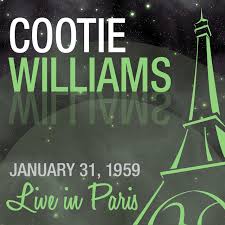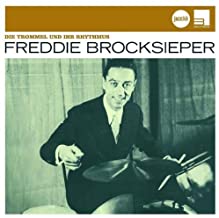
Daily Dose Of Jazz…
George F. Clarke was born on August 28, 1911 in Memphis, Tennessee. He attended Manassas High School, where he was Jimmie Lunceford’s pupil before joining the orchestra and playing with Lunceford until 1933.
Relocating to Buffalo, New York, there he played with Guy Jackson, Lil Armstrong and Stuff Smith in 1935. He and Smith worked together again on tour in 1939-1940 and in the recording studio. Returning to Buffalo, Clarke led an ensemble at a local club from 1942 to 1954.
Following this he moved to New York City and worked with Wild Bill Davis and Jonah Jones, and toured internationally in Europe in 1959 with Cootie Williams and Africa with Cozy Cole in 1962. He was occasionally active through the ‘60s in New York City. Tenor saxophonist George Clarke passed away in September 1985 in the Bronx, New York.
More Posts: history,instrumental,jazz,music,saxophone

Daily Dose Of Jazz…
Fritz “Freddie” Brocksieper was born on August 24, 1912 in Constantinople, Turkey, the son of a Greek-speaking Jewish woman and a German engineer who was able to get through National-Socialism as an essential swing musician.
Considered a leading figure of early European big-band jazz, by 1930 was working in Nuremberg and Berlin in the 1930s. By World War II he was playing around Germany with different people, the Goldene Sieben (Golden Seven), Benny De Weille, Willy Berking, and the radio orchestra of Lutz Templin, just as in the National-Socialist propaganda band Charlie and His Orchestra.
After the war he led various bands in Stuttgart, Munich, and Berlin, Germany and also played in American officers’ clubs. With his bands Freddie made it to the front page of Stars and Stripes. Beginning in 1957 Bavarian radio regularly broadcast live concerts from his studio in Munich.
Brocksieper continued performing into the 1960s and 1970s, and was awarded a Deutscher Schallplattenpreis in 1980. From 1964 he played mainly in trios, and often with American soloists in Europe. His drumming style was influenced by Gene Krupa. He recorded with his own ensembles, both large and small, in the late 1940s. From 1964 he played mainly in trios and with visiting American soloists. Drummer Freddie Brocksieper passed away on January 17, 1990.
More Posts: drums,history,instrumental,music

Daily Dose Of Jazz…
Kjeld Bonfils was born on August 23, 1918 in Copenhagen, Denmark. He was one of the figures involved in the Golden Age of Danish jazz in the 1930s.
During the Nazi occupation of Denmark from 1940 to 1945, jazz was discouraged by the regime, but Bonfils played with Svend Asmussen in Valdemar Eiberg’s band, as well as elsewhere. Jazz became a symbol of the underground and political protest.
Pianist and vibraphonist Kjeld Bonfils, who was hailed as one of the best soloists of his day, passed away on October 13, 1984 at age 66.
More Posts: bandleader,history,jazz,music,piano,vibraphone

Daily Dose Of Jazz…
Bumps Myers was born Hubert Maxwell Meyers on August 22, 1912 in Clarksburg, West Virginia. Moving to southern California with his family when he was nine years old, he began playing with Curtis Mosby in the late 1920s.
The 1930s saw him playing with Buck Clayton including on a tour of China. In addition, he played with Lionel Hampton and Les Hite. In the 1940s Bumps performed extensively with Benny Carter, Lester Young, Jimmie Lunceford, Sid Catlett, T-Bone Walker, Benny Goodman, and Russell Jacquet.
Through the 1950s he continued performing live and working as a session musician, with Jimmy Witherspoon, Helen Humes, Red Callender, Louie Bellson, and Harry Belafonte. After working with Horace Henderson in the early 1960s, he put together his own group Bumps Myers & His Frantic Five and recorded prior to retiring due to health problems.
Tenor saxophonist Bumps Myers, who also on occasion played alto and soprano, passed away on April 9, 1968 in Los Angeles, California.
More Posts: bandleader,history,instrumental,music

Daily Dose Of Jazz…
Lennie Felix was born in Stamford Hill, London, England on August 16, 1920. He learned piano from the age of ten and his playing style reflected the influence of Fats Waller, Art Tatum and Earl Hines. His later influences drew from Keith Jarrett, Charlie Parker and Vladimir Horovitz.
From the 1960s, Lennie performed increasingly more as a solo pianist and appeared regularly at the PizzaExpress Jazz Club, where he also accompanied US visitors like Bud Freeman and Buddy Tate.
He worked in the bands of Nat Gonella, Harry Gold, and Sid Philips, and enjoyed a 20-year association with trumpeter Freddy Randall. Pianist Lennie Felix passed away on December 29, 1980 in a hospital after he was hit by a speeding car near to the 606 Club in Fulham, West London.
More Posts: bandleader,history,instrumental,jazz,music,piano


